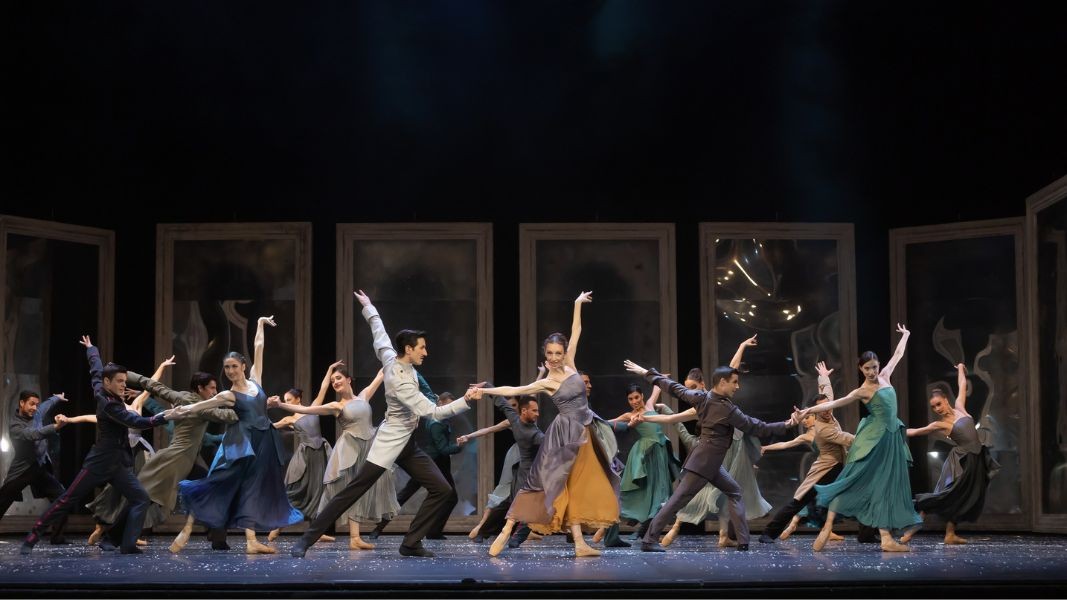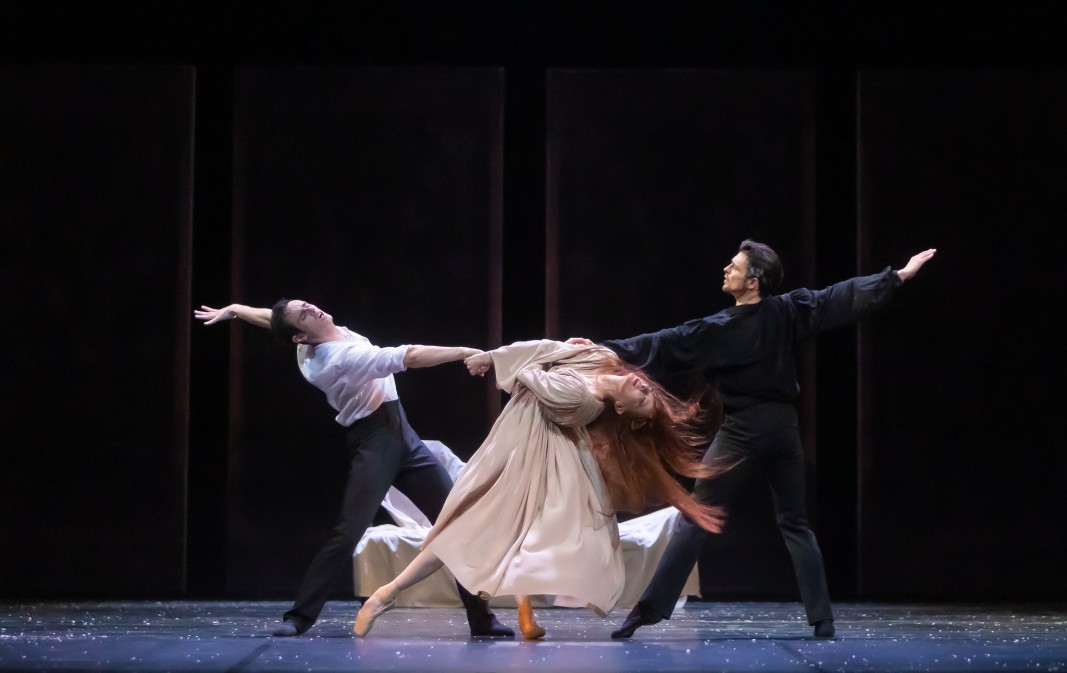A pearl has been added to the repertoire of the ballet of the Bulgarian National Opera – the ballet “Anna Karenina”. With this year's most important ballet premiere just having triumphantly marched for a second round in April - all performances sold out months ago, we talk to its choreographer Leo Mujić.
He strikes as a highly intelligent person, although slightly self-absorbed – as most talented people are. Leo believes that he must learn the language of each country he is staging in. He does sport a pretty fluent although nor so grammatically correct Bulgarian, having worked in the country for several months. When it comes to interviews, he’d rather speak English, as his vocabulary is richer and his wording more precise.
Who is Leo Mujić?
An internationally acclaimed ballet artist before he turned to choreography and became even more famous. He graduated from the Ballet School in Belgrade, where he lived and studied until the Yugoslav war. He was 16 years old at the time and, realizing that the situation in his home country was not going to get better soon, left for Lausanne to study at the school of Maurice Béjart. As a dancer he has performed choreographies by Maurice Béjart, A. Silvestrin, M. Donlon, Jiří Kilian, William Forsythe, Matz Ek, etc., and has worked with leading European companies such as the Paris Opera, Stuttgart Ballet, Berlin Staatsballet. Later, as a choreographer he has made a solo choreography for David Hallberg (American Ballet Theater) and for Aurelie Dupont (Paris Opera) as well as outstanding pieces for the duo Jacoby & Pronk, Augsburg Ballet, Tanz Academy Zurich, Staatsballet Berlin, New National Theater Tokyo, Tokyo City Ballet, Dance Academy Budapest, the Hungarian National Theatre of Pécs, Slovenian National Theatre in Ljubljana, Croatian National Theatre in Zagreb, and many other venues. He was influenced by William Forshyte, Jiri Kylian, Matz Ek, Nacho Duato.
Besides “Anna Karenina”, first staged for the Croatian National Theatre in Zagreb in 2014, he has also produced “The Great Gatsby”, “Orpheus”, “Scheherazade”, “Dangerous Liaisons”, “A Midsummer Night's Dream”, “Pride and Prejudice”. “I am making Hamlet next year in Zagreb – he says for the BNR. - I love to make ballets which were never made. I'm gonna make Count Monte Cristo, Queen Margot…“
He is very straightforward, no beating about the bush, when it comes to his art. Of course, we ask him what are his impressions, after having worked with the Sofia opera house ballet dancers?
“The level is very different: from the absolute superstars, world superstars, to people who can never get a job anywhere else, he tells Radio Bulgaria reporter Elizabeth Radkova. So the eclecticism and the difference of the level is quite big. One company is as good as its weakest link. When I go to Stuttgart ballet, or that kind of huge companies, the differences between the corps de ballet and the principle dancers is not so big. The people who are getting jobs at these big companies are the people who can become soloists. Acceptance of their position here is extremely clear. They come (in this company – ed.), they accept their position as a corps de ballet, in a way they maybe stop working and they don't strain to make it to the top. But next to them there are incredible superstars. Can you really talk about them coming from the same school - the superstar and then the guy who can't get a job anywhere else? Because it's not just the ballet school's responsibility. It's up to them how they decide to work. How they are authorized maybe, because they have a lifelong contract.”
 As to the mainly classical repertoire of the National ballet company, he says:
As to the mainly classical repertoire of the National ballet company, he says:
“Extreme connection to the Soviet Union, it's not updated to the way of how they are going on stage, but I think this comes from the repertoire, when you come here and you have “Swan Lake”, “Corsair” and then “Swan Lake” and then maybe “Corsair” again, then it's kind of complicated to speak of development, of the dance reality of the 21st century.”
Leo Mujić thinks it is good that in the last 5-10 years ballet companies in Bulgaria have internationalized and hired more and more dancers from all over the world – Portugal, Italy, Great Britain and even Japan.
"I believe in the internationalism and intercontinentalism of the profession. I don't think that the job of the National Theatre is to sustain the wishes of the (National ballet – ed.) school, and the wishes of "we are Bulgarian ballet, we have Bulgarian dancers. No, you need to have the best possible product".
 Leo does not think that the fact that young Bulgarian dancers cannot find work in theatres in the country after they finish school is a good reason to have Bulgarian-only companies. His words of advice for aspiring dancers are:
Leo does not think that the fact that young Bulgarian dancers cannot find work in theatres in the country after they finish school is a good reason to have Bulgarian-only companies. His words of advice for aspiring dancers are:
“If you really want to dance, then you'll behave like a Japanese girl - going online, and ending up in places they've never heard of, like Stara Zagora, Burgas or Varna. Those places don't exist in Japanese brain of geographical requirement, but they want to dance. You come out of the comfort of Japanese life, and you go to other countries which are having problems to organise the streets pavement. You go there and you learn what is a banitsa, and you live your life with an incredibly small sallary, but you're happy to dance.”
Being a dancer or a choreographer can be a very demanding job. Not for Leo Mujić:
“I live very well off my profession, Leo says. I work a lot for it and I respect it, dance gave me everything what I have and own, and defined me as a person. I'm extremely grateful to live really well from something that I really love to do. But this is only me. This is not my job - this is my lifestyle. Success is to be practiced. I was not born successful.”
Photos: Sofia Opera House, Alexander Bogdan Thompson
English version: Elizabeth Radkova
The short animated film "Life with an Idiot" by Theodore Ushev won the best film award at the Beijing International Short Film Festival. The animator announced the news on his Facebook profile. "I am very happy because it is..
The Vladigerov brothers will provide a live musical accompaniment to a silent film at Vienna’s Metro Kulturhaus cinema , marking their second time taking on the challenge. The historic Metro Kino has been run by the Austrian Film Archive since 2002,..
The film “Made in EU” by director Stefan Komandarev won the Audience Grand Prize at the 63rd Gijón International Film Festival in Spain. The film triumphed in competition with 95 titles, BTA has reported. “Within a few days, we..

+359 2 9336 661
